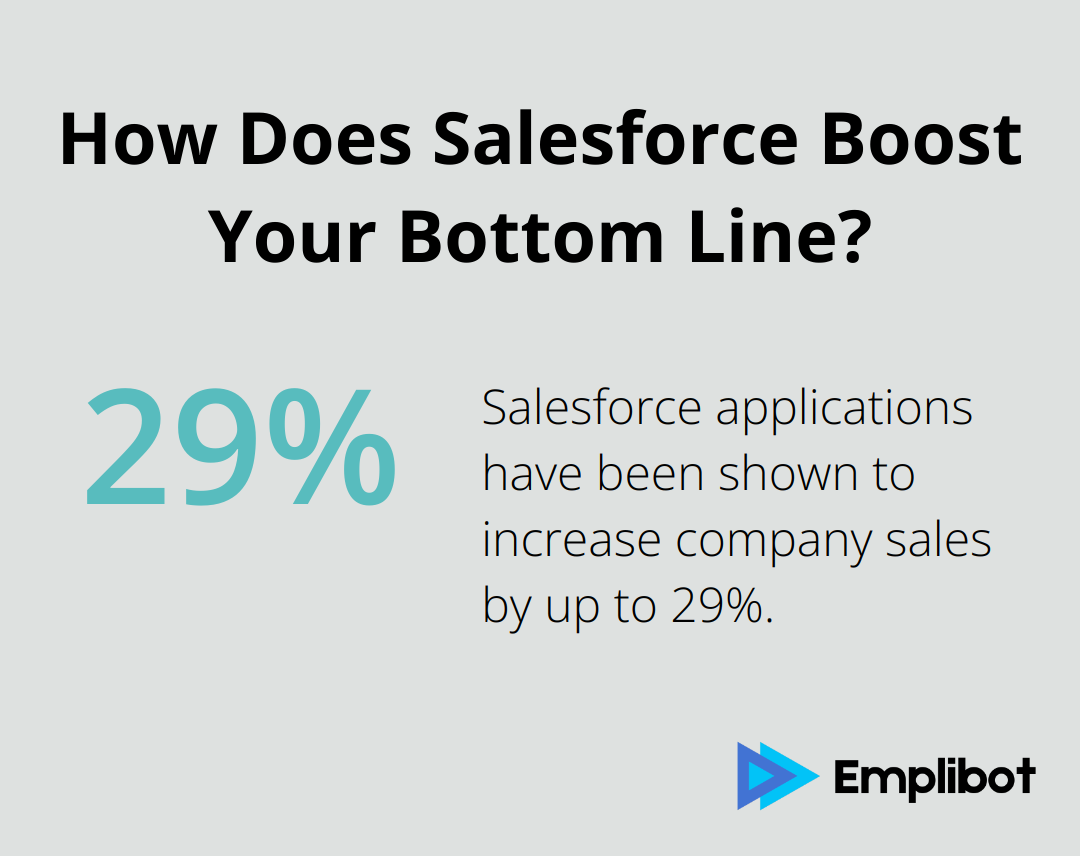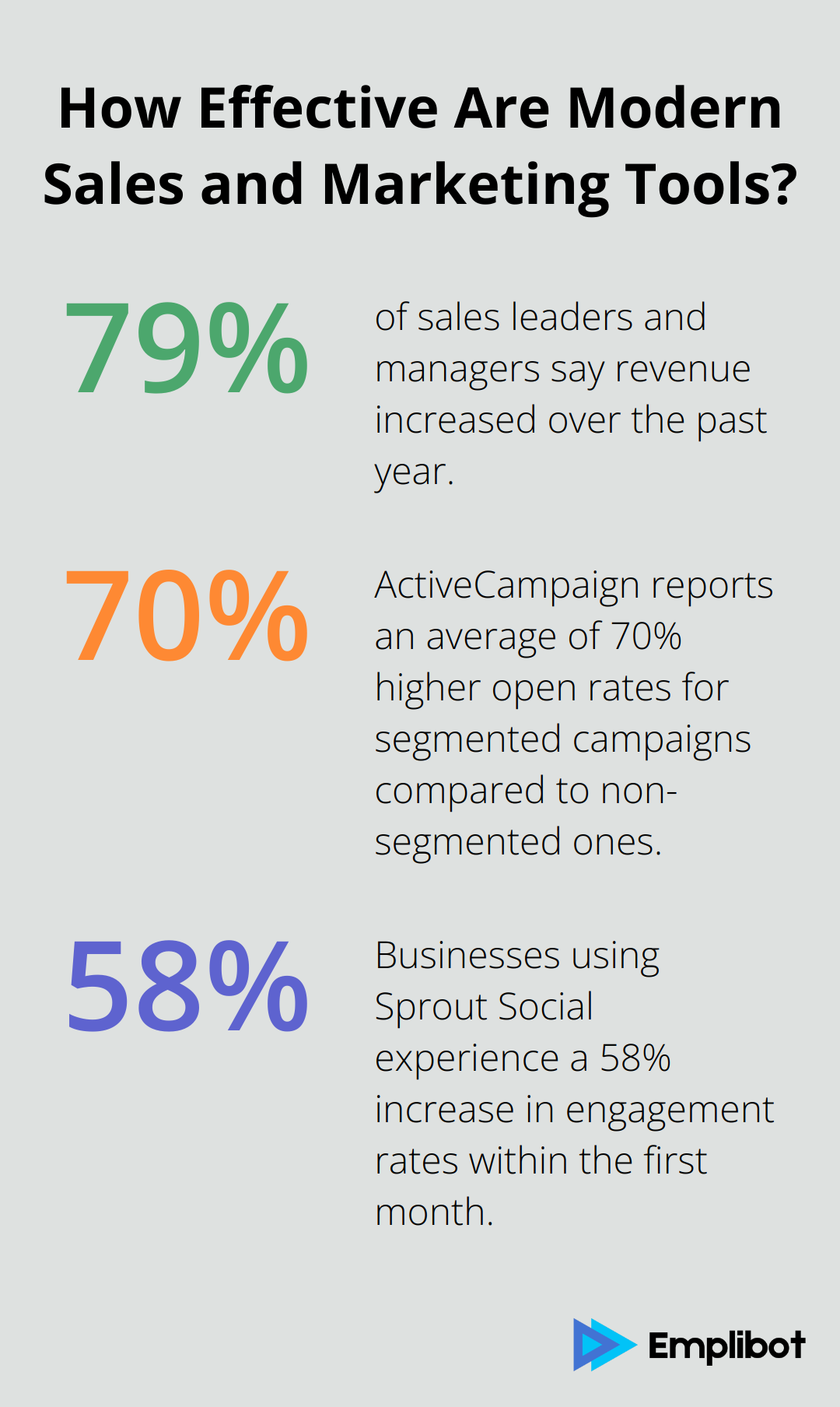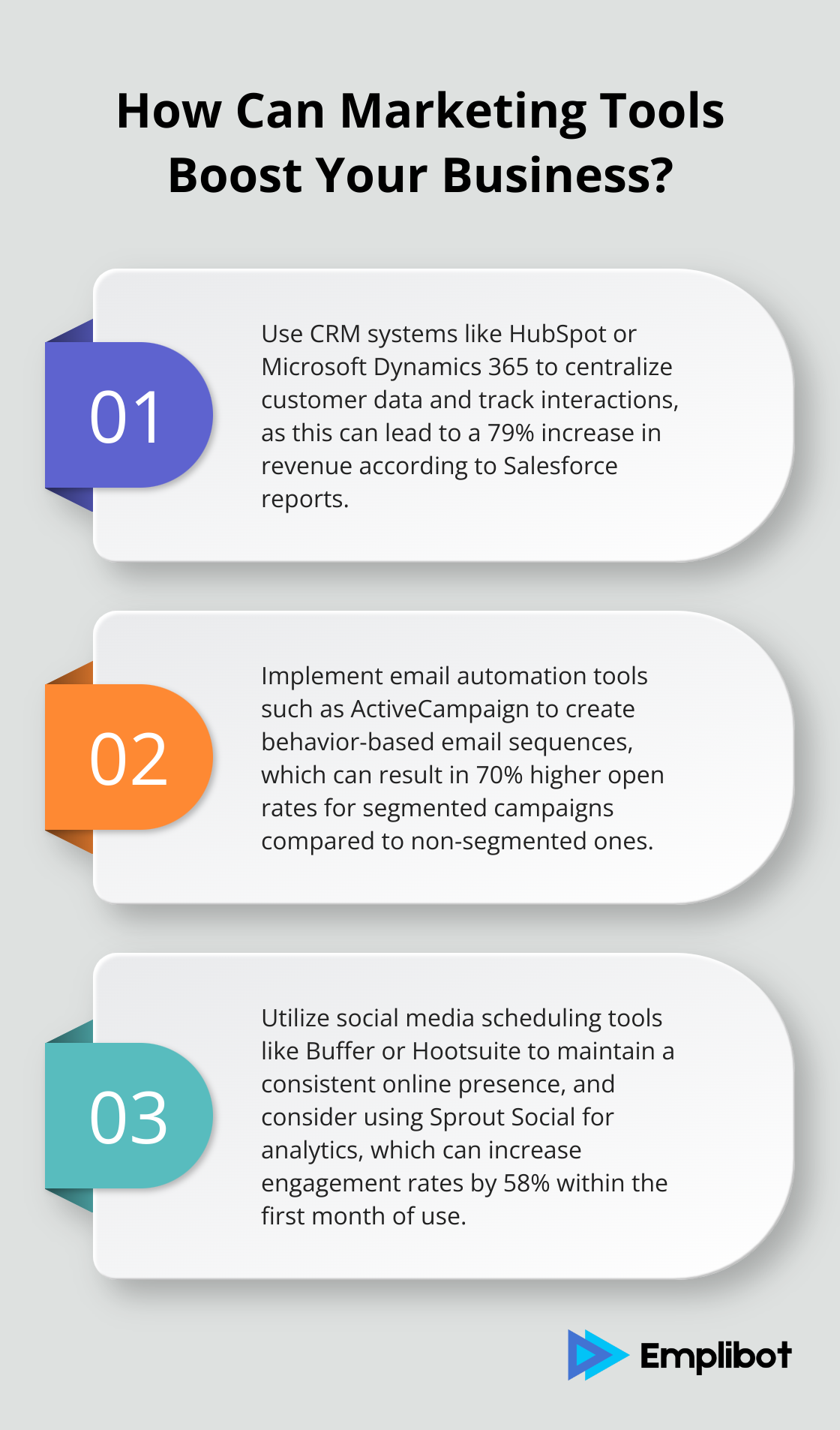At Emplibot, we’ve seen firsthand how sales and marketing automation revolutionizes business operations. But what is sales and marketing automation exactly?
This powerful technology streamlines repetitive tasks, enhances customer interactions, and drives growth through data-driven strategies. In this post, we’ll explore the core concepts, benefits, and tools that make automation an essential asset for modern businesses.
What Are Sales and Marketing Automation Systems?
Core Components of Automation Systems
Sales and marketing automation systems transform business processes through software that automates repetitive tasks. These systems free up time for sales and marketing teams to concentrate on strategy and high-value activities.
Customer Relationship Management (CRM) platforms form the foundation of these systems. Salesforce applications have been shown to increase company sales by up to 29%. These platforms centralize customer data, track interactions, and offer insights for personalized engagement.
Email automation stands out as another essential component. This tool enables businesses to send targeted messages based on customer behavior or predefined triggers.

Lead scoring plays a vital role in automation systems. This feature helps prioritize leads based on their conversion likelihood, ensuring sales teams focus on the most promising prospects.
Sales Automation vs. Marketing Automation
While often used in tandem, sales and marketing automation serve distinct purposes:
Marketing automation focuses on:
-
Attracting and nurturing leads through various channels
-
Social media scheduling
-
Content distribution
-
Lead capture forms
Sales automation streamlines the sales process itself:
-
Automated follow-ups
-
Appointment scheduling
-
Proposal generation
Marketing automation drives a 14.5% increase in sales productivity and a 12.2% reduction in marketing overhead overall, according to Nucleus Research.
Integration for Comprehensive Solutions
Modern businesses benefit from integrating both sales and marketing automation features. This integration provides a comprehensive solution that handles everything from content creation to lead nurturing, ensuring a seamless flow from initial contact to conversion.
As technology continues to evolve, staying updated on these tools will prove essential for maintaining a competitive edge in the digital marketplace. The next section will explore the specific benefits that businesses can expect when they implement these powerful automation systems.
Why Automation Boosts Business Performance
Skyrocketing Productivity
Sales and marketing automation isn’t just a trendy buzzword-it’s a game-changer for businesses looking to scale efficiently. The numbers prove its transformative power. Nucleus Research reports that marketing automation drives a 14.5 percent increase in sales productivity and a 12.2 percent reduction in marketing overhead. This shift allows teams to focus on high-value activities (like strategy development and relationship building) instead of manual data entry or repetitive follow-ups.
Supercharging Lead Generation
Automation turns lead generation into a well-oiled machine. HubSpot’s research reveals that businesses using marketing automation to nurture prospects experience a 451% increase in qualified leads. This statistic highlights not just quantity, but quality-these are leads more likely to convert.
Personalizing Customer Experiences at Scale
Modern consumers demand personalized interactions, and automation makes this possible on a large scale. Automation tools leverage customer data to tailor content, product recommendations, and communication timing to individual preferences.
Data-Driven Decision Making
Guesswork is out; data reigns supreme. Automation platforms provide a wealth of insights that inform strategy. A/B testing becomes effortless, allowing teams to optimize everything from email subject lines to landing page designs.
Streamlining Operations
Automation streamlines operations across the board. It reduces human error, ensures consistent communication, and frees up resources for innovation. This efficiency translates to cost savings and improved ROI (Return on Investment). Companies that implement automation often see a significant reduction in operational costs and an increase in overall productivity.

As businesses explore automation options, it’s crucial to consider comprehensive solutions that integrate various aspects of sales and marketing. The next section will explore some of the most popular tools that make these impressive results possible.
Top Tools for Sales and Marketing Automation
CRM Systems: The Backbone of Sales Automation
Customer Relationship Management (CRM) systems form the foundation of effective sales automation. Salesforce reports that 79% of sales leaders and managers say revenue increased over the past year. These platforms centralize customer data, track interactions, and provide valuable insights for personalized engagement.

HubSpot CRM offers a free version that appeals to small and medium-sized businesses. It integrates with other marketing tools and provides a user-friendly interface for managing contacts, deals, and tasks.
For enterprises, Microsoft Dynamics 365 combines CRM capabilities with ERP functionalities. This integration allows for a comprehensive view of customer interactions across all business processes.
Email Marketing: Personalization at Scale
Email remains one of the most effective channels for marketing, and automation enhances its power. Mailchimp users see an average email open rate of 21.33%, which surpasses the industry standard.
ActiveCampaign excels in advanced automation features. It enables complex, behavior-based email sequences that improve engagement rates. Their platform reports an average of 70% higher open rates for segmented campaigns compared to non-segmented ones.
Emplibot stands out by automating email campaigns and generating content for those emails. This all-in-one solution saves businesses time in content creation and campaign management.
Social Media: Consistency is Key
Consistent social media presence matters, but it requires significant time investment. Tools like Buffer and Hootsuite allow you to schedule posts across multiple platforms, ensuring your content reaches your audience at optimal times.
Sprout Social offers robust analytics alongside scheduling features. Their data indicates that businesses using their platform experience a 58% increase in engagement rates within the first month.
Analytics: Data-Driven Decision Making
Google Analytics (free and integrating with most other marketing tools) remains the gold standard for website analytics, offering deep insights into user behavior.
For more advanced needs, Mixpanel offers event-based analytics that track specific user actions. This granular data proves invaluable for optimizing conversion funnels and improving user experience.
The right combination of these tools can dramatically improve your sales and marketing efforts. The goal extends beyond task automation; it focuses on creating more meaningful interactions with your customers. As you implement these tools, consider how they can help you better understand and serve your audience.
Final Thoughts
Sales and marketing automation has transformed business operations, offering unparalleled efficiency and personalization. This technology streamlines repetitive tasks, enhances lead generation, and provides data-driven insights, which allows teams to concentrate on strategic activities. The future of automation will likely involve more sophisticated AI and machine learning, enabling advanced personalization and predictive analytics.

Successful implementation of sales and marketing automation requires clear goal-setting and selection of tools that match specific business needs. Companies should prioritize data quality and system integration to maintain a unified customer view. Training teams to maximize these tools’ potential and fostering a culture of continuous improvement are essential steps in the automation journey.
Emplibot offers a comprehensive solution for businesses looking to streamline their content marketing efforts (https://wp.emplibot.com). Our platform automates everything from keyword research to content creation and distribution. Understanding what sales and marketing automation is and how to leverage it effectively can unlock a business’s full potential in the digital age.

